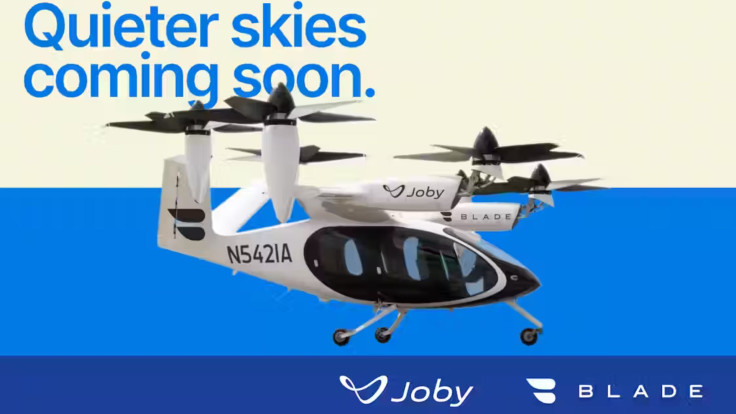Joby Stock Sees Bump After Offer to Buy Blade for $125 Million: Is There Future for Air Taxis?

Joby Aviation has seen its stock take flight following reports that it is in advanced talks to acquire Blade Air Mobility in a deal worth $125 million (£93.93 million).
The potential acquisition marks a bold step in the race to commercialise electric air taxis and reshape urban transportation.
The deal, if finalised, would grant Joby access to Blade's premium passenger infrastructure and loyal customer base—key components in the rapid deployment of Joby's next-generation eVTOL (electric vertical take-off and landing) aircraft.
Evolving Stock Performance
Joby Aviation shares have experienced a significant surge this year, climbing over 80% year-to-date and nearly 240% over the past 12 months. The stock recently hit an all-time high of around $18.93 (£14.22), reflecting strong investor confidence in the company's progress.
The key drivers include advancements in piloted eVTOL flight testing and increased manufacturing capacity. With momentum building around urban air mobility, Joby continues to outperform broader market trends.
Analysts noted that growing regulatory clarity and infrastructure development are helping bolster sentiment around the sector, positioning Joby as a leader in the evolving electric aviation space.
More on Joby's Acquisition of Blade
In a press statement, Joby said it aims to accelerate its path to commercialisation by leveraging Blade's established infrastructure and transitioning its loyal helicopter passenger base to Joby's next-generation aircraft. This approach is expected to lower both infrastructure spending and the cost of acquiring new customers.
Moreover, the acquisition not only provides Joby with instant access to key urban markets and infrastructure in New York City and Southern Europe, but also enables the integration of its advanced technology with Blade's ten years of experience in delivering high-end passenger transportation at scale. This strategic move supports Joby's preparations to launch passenger service in Dubai next year.
An Overview of Blade's Business Model
Blade flew more than 50,000 passengers in 2024 from a network of 12 urban terminals situated in some of the most critical urban air mobility markets in the world. This includes dedicated lounge and terminal bases at John F. Kennedy International Airport and Newark Liberty Airport, as well as the West Side of Manhattan, the East Side of Manhattan and Wall Street. Blade passenger operations are expected to continue as usual, with the business continuing to be led by Blade founder and CEO Rob Wiesenthal, who serves as a wholly owned subsidiary of Joby.
As part of the agreement, Joby will become the preferred VTOL partner for Blade's organ transport division, which will operate independently as a separate public company under the new name Strata Critical Medical. This partnership aligns with Joby's ongoing development of mission-critical air medical services, highlighting potential applications for its aircraft beyond passenger travel.
Additionally, Joby's ElevateOS software, designed to support efficient air taxi operations, will be incorporated into Blade's systems to enhance operational efficiency and the overall passenger experience.
Looking Ahead at Commercialisation
For JoeBen Bevirt, founder and CEO of Joby Aviation, the acquisition plays a 'significant role' in supporting the launch of Joby's commercial operations in Dubai, their subsequent global rollout and continued leadership in the air taxi sector.
'With access to the infrastructure they have secured and the loyal customer base they have developed, we will be in the best possible position to launch our quiet, electric aircraft as soon as certification is secured,' he said.
Meanwhile, Blade founder and CEO Rob Wiesenthal, commented that it is 'crystal clear' from Joby's progress on certification to its demonstration flights in New York and Dubai that this business is the best possible home for Blade's fliers, its team and partners.
'Blade was founded with the mission of democratising short-distance air travel by facilitating the transition from conventional rotorcraft to quiet, emissions-free electric aircraft, and I believe there is no better partner than Joby to make that mission a reality,' he said.
What Potential Lies Ahead for Air Taxis?
Air taxis—electric vertical take-off and landing (eVTOL) vehicles—could unlock a transformative global market. According to Morgan Stanley, the Urban Air Mobility (UAM) sector is projected to reach $1 trillion (£751.03 billion) by 2040 and expand to $9 trillion (£6.75 trillion) by 2050, encompassing passenger transport, logistics, tourism, and public safety.
Conservative forecasts still expect growth from roughly $5 billion (£3.76 billion) in 2025 to $70 billion (£52.6 billion) by 2040, at a CAGR of 19%. Industry surveys suggest a strong consumer appetite: almost 98% of frequent US fliers would consider riding an air taxi, with 80% saying they'd travel more often if available.
With strategic acquisitions, strong partnerships, and growing consumer interest, companies like Joby Aviation are well-positioned to lead this next phase of mobility.
ElevateOS to Power Blade's Future Operations
As part of the integration, Joby will embed its proprietary ElevateOS platform into Blade's systems. This software suite is designed to streamline air taxi logistics, enhance passenger experience, and ensure smooth scheduling of flights across congested urban routes.
© Copyright IBTimes 2025. All rights reserved.




















